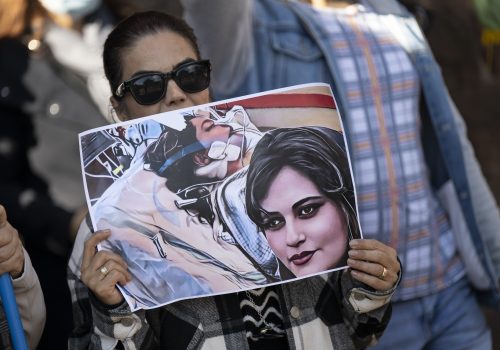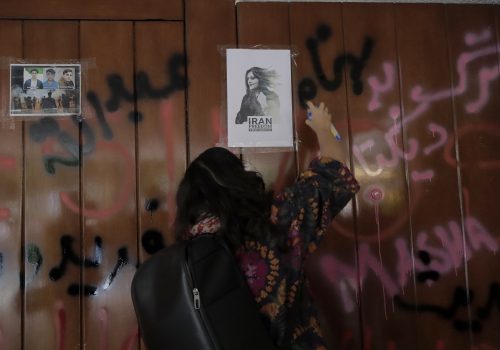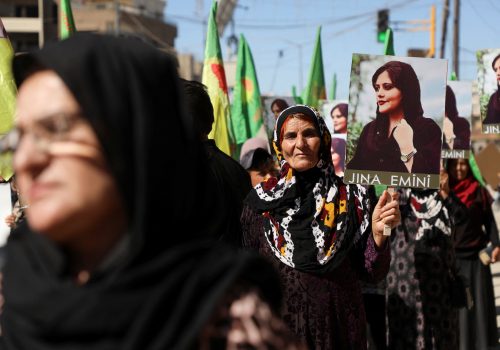The protests in Iran have an anthem. It’s a love letter to Iran.
The pandemic has just hit Iran. It’s February 2020. We still do not know how ugly things will become. It is our second date. Shy and well-aware of the deadly price of being gay in Iran, he reaches out and holds my hand in a not-too-crowded café in central Tehran. There are fireworks in our eyes.
Later that night, in the eerie silence of Tehran’s deserted streets in the early days of the pandemic, we hold hands and steal a kiss.
I get transported to that moment and all its glory by listening to a song about Iran’s ongoing protests that singer Shervin Hajipour dropped on September 28: “For the sake of,” which captivated the whole nation.
The song and its video encapsulate a viral trend on Persian language Twitter amid the current uprising that has been triggered by the September 16 death of Mahsa Amini.
The twenty-two-year-old ethnic Kurd woman, also known by her Kurdish given name Jina, went into a coma after being arrested by Iran’s “morality police” on September 13 for “violating” strict hijab rules, or Islamic dress code. Three days later, she passed away. Evidence points to her being beaten up during her detention and her family has accused the authorities of a cover-up. Enraged by her death, people young and old have taken to the streets for thirteen consecutive days to protest.
Since Amini’s murder, Iranian Twitter users from different backgrounds have been writing about why they are participating in the uprising, starting with the phrase “for the sake of.”
As has been the case since the 2009 pro-democracy Green Movement, the internet and social media have played a key role in inflaming the protests, sustaining them, and helping people organize. Amid all this, many Iranians have taken to Twitter to write about their experiences participating in these demonstrations and their reasons for joining them.
Quoting these tweets, Hajipour sings why people are protesting. The first verse hits me hard: For the dream of dancing on the streets and the fear of kissing a lover in public.
Posting the track on his Instagram account with close to one million followers, Hajipour wrote: “You wrote this poem. May it ease all your pains.”
After that powerful opening, the song continues that people are protesting for change; changing rusted minds; for Iran’s economic collapse; the shame that parents feel when they can’t afford normal things that have become luxuries out of reach; for the denied yearning that all Iranians have for a normal life; for the kids who have been forced to engage in “waste picking” and Afghan refugees who are systematically discriminated against; for Iran’s collapsing environment and endangered species like the Asiatic cheetah; for the passengers of Ukrainian passenger airliner PS752 that was downed by the Islamic Revolutionary Guards Corps (IRGC) in 2020, killing all 176 people onboard.
The list goes on: for the ruin that the Islamic Republic has left in its trail; for the empty slogan of “death to America” and the regime building hell on earth to take people to “heaven”; for all who are in jail; for the unending river of tears that do not seize; for a moment of peace.
The song even touches upon a debate—and hopefully not a divide—among people revolving around one of the main slogans of the protests: “women, life, liberty.”
Some figures, including popular retired footballer Ali Karimi, who has lent his support and platform to the uprising from abroad, have added “men, homeland, prosperity” to the chant.
The new slogan was even picked up and used by students at Shiraz University of Medical Sciences. However, many, including feminists, have criticized the new slogan, saying it would take the original slogan’s edge off and compared it with those pushing “all lives matter” during the Black Lives Matter protests in the United States.
In the song, Hajipour mentions the new slogan—but in what appears to be a conscientious artistic choice—and immediately adds a verse about participating in the protests “for the sake of all women who have at least once wished that they were born men.”
He is not the only Iranian or international artist to come out in support of the protests. Others include Iranian actor Katayoun Riahi and singer Homayoun Shajarian, along with Dua Lipa. Hit songs like Tom Odell’s “Another Love,” with its defiant tone, have been widely used in video collages of footage from the protests as well.
However, Hajipour’s work has been one of the few that has captivated people to this degree—be it in Iran or the diaspora. In less than forty-eight hours since the song came out, Hajipour’s original post on Instagram has been watched close to forty million times and received 1.5 million likes amid an almost total internet shutdown in Iran.
The soft song with its lyrics—fittingly and symbolically written collectively by the whole nation—is a love letter to every individual who is braving guns and bullets while participating in the protests. It is a love letter to a nation that has risen, a love letter that crescendos to a soft closure: “For women, life, liberty… for liberty.”
NOTE: Shervin Hajipour was arrested by security forces on September 29 and the song was deleted from his Instagram account. We have no information about his well-being.
Khosro Sayeh Isfahani is an advocate, journalist, and Internet researcher with years of experience working in Iran, including work related to the LGBTQI community.
Further reading
Tue, Sep 27, 2022
How to turn Iran’s moment into a movement
IranSource By Borzou Daragahi
In Iran, the momentum is there. It just needs direction and a helping hand.
Wed, Sep 28, 2022
I’m a member of Gen Z from Tehran. World, please be the voice of the people of Iran.
IranSource By
To all the brave and beautiful people out there who know what freedom feels like, be our voice.
Mon, Sep 26, 2022
‘Women, life, liberty’: Iran’s future is female
IranSource By
Women, young and old, have been at the forefront of the uprising, just like every other protest in Iran over the past decades.
Image: A woman cuts her hair during a protest against the Islamic regime of Iran and the death of Mahsa Amini in New York City, New York, U.S., September 27, 2022. REUTERS/Stephanie Keith


